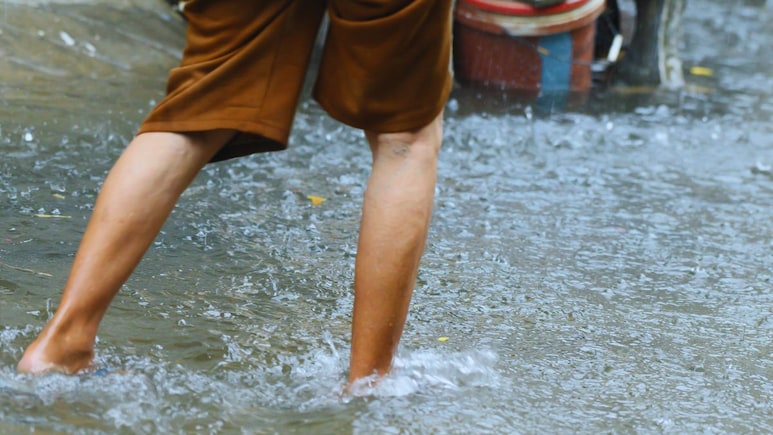
With the arrival of monsoon, the risk of diseases and infections increases significantly. In Mumbai, a notable rise in vector-borne diseases such as dengue, malaria, and chikungunya has been observed, along with a surge in leptospirosis cases during the rainy season. This monsoon, a sharp rise in dengue and leptospirosis cases has been reported in Mumbai over the past few months.
Leptospirosis is a recurrent issue during Mumbai rains. Dr. Tushar Shah, a Mumbai-based physician says, "Significant water logging due to multiple factors like drainage issues, high tides, construction sites, slums, soil scarcity etc. Plus rat infestations again due to multiple factors" are some of the reasons why leptospirosis cases surge during monsoon in Mumbai.
For the unversed, leptospirosis is a bacterial infection which typically causes flu-like symptoms. Caused by the bacteria Leptospira, leptospirosis can infect both humans and animals.
About leptospirosis
Leptospirosis usually spreads through contaminated water or soil. Urine or body fluids of infected animals can easily contaminate water and soil, especially during heavy rainfall. Directly touching body fluids from an infected animal or eating food or drinking water contaminated by an infected animal can transmit the disease.
What are the symptoms of leptospirosis?
Leptospirosis typically causes flu-like symptoms; however, some individuals may not experience any symptoms at all. "While, high fever and severe bodyache, especially calf pains and eye pain can be seen in mild cases, cough, deep yellow urine, breathing difficulty, vomiting are some of severe symptoms," Dr. Shah adds.
Common signs and symptoms include:
- High fever
- Abdominal pain
- Headache
- Muscle pain
- Nausea and vomiting
- Diarrhea
- Chills
- Jaundice
- Rash
If left untreated, leptospirosis can lead to kidney damage, meningitis (inflammation of the membrane around the brain and spinal cord), liver failure, trouble breathing, and even death.
In some cases, flu-like symptoms can worsen into Weil's syndrome, a life-threatening illness. These severe symptoms may start three to 10 days later. Some of these include blood in cough, chest pain, blood in pee, red spots on the skin, and a decrease in the amount of pee.
How to prevent leptospirosis
"Avoid walking in flooded areas, especially if there are skin-breaks in feet. Wear good footwear and pest control and rapid drainage remain the pillars of prevention," the expert recommends.
Additionally, he has advised that all individuals "who waded in flooded streets yesterday or today should take Doxycycline 100 mg two capsules at a time with 200 ml of water. If allergic to doxycycline or if pregnant or if less than 9 years age, take azithromycin 250 mg single dose after food" to prevent leptospirosis.
1. Avoid any contact with contaminated water
Stay away from water bodies, especially during heavy rains or floods, as they may be contaminated with animal urine.
2. Wear protectie gears
Wear rubber boots, gloves, and protect your skin from contact with potentially contaminated soil or water, especially if you work in agriculture or are involved in jobs that may expose you to contaminated water or soil.
3. Practice hand hygiene
Wash your hands thoroughly with soap and water after contact with soil or water. Also, ensure that any cuts or wounds are cleaned and covered.
4. Rodent control
Since rats and other rodents can carry leptospirosis, keep your nearby surroundings clean to avoid them. Store food in sealed containers and do not leave any item that can lead to a potential infection.
5. Safe drinking water
Drink only treated or boiled water, especially if living in areas prone to leptospirosis spread.
6. Spread awareness
Raise awareness about leptospirosis and its transmission among community members, especially in high-risk areas.
7. Vaccination for pets
Consult a veterinarian about vaccinating pets against leptospirosis, as they can also be carriers.
8. Do not ignore symptoms
After potential exposure, be vigilant about any symptoms that may arise within the next few weeks. Seek medical attention early if symptoms develop.
By following these prevention tips, you can significantly reduce the risk of contracting leptospirosis, especially during the monsoon season when the risk is heightened.
(Dr. Tushar Shah is a Mumbai-based physician)
Disclaimer: This content including advice provides generic information only. It is in no way a substitute for a qualified medical opinion. Always consult a specialist or your own doctor for more information. NDTV does not claim responsibility for this information.
Track Latest News Live on NDTV.com and get news updates from India and around the world

